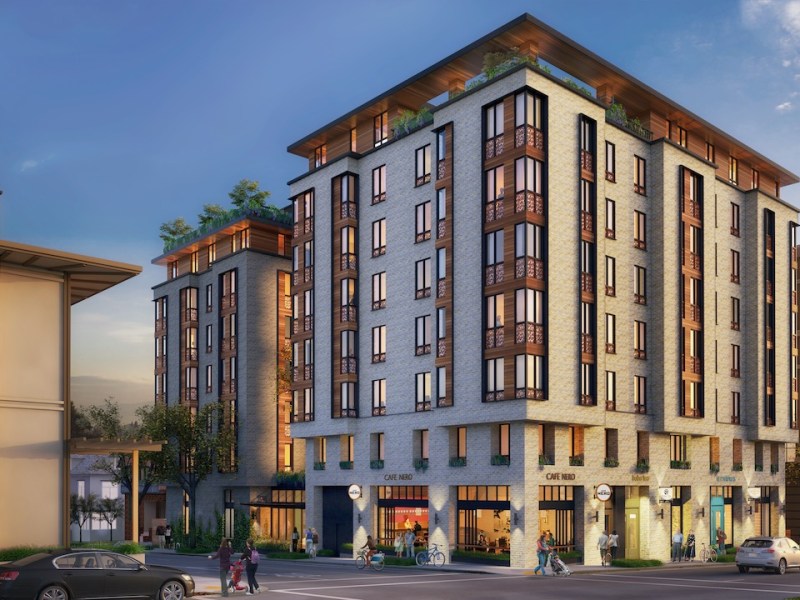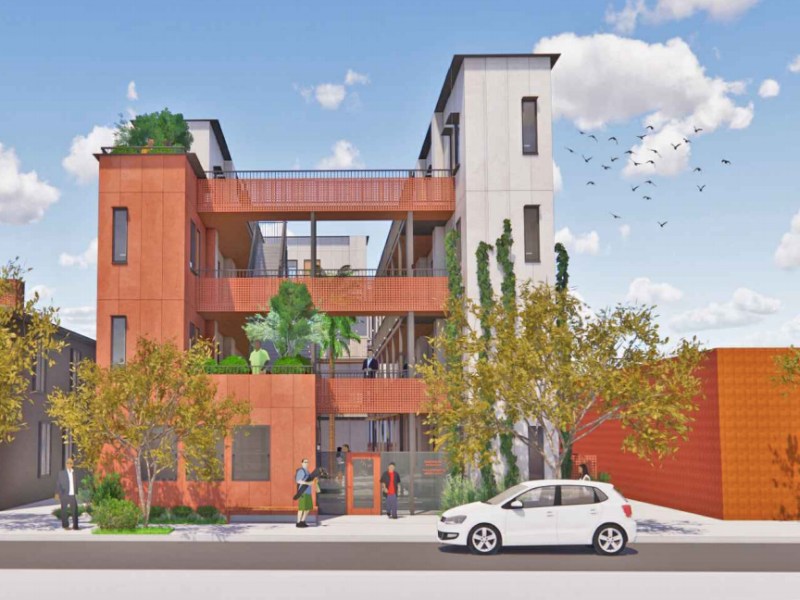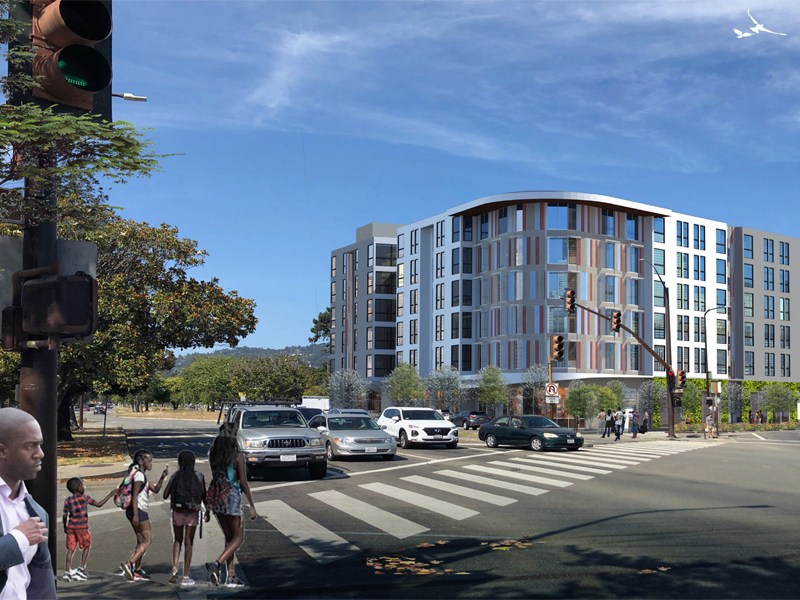
A 41-unit “group living” project called Poet’s Place was approved Thursday night by a Berkeley zoning board majority.
The four-story project, at 2435 San Pablo Ave. (between Dwight Way and Channing Way) is slated to be built on what is now a parking lot alongside now-closed vintage furniture shop Mignonne Decor. The project team said it hopes to begin construction next summer and be open for residents in mid-2022.
A number of community members have raised questions about aspects of the project, including the 200-square-foot rooms, the safety of shared common spaces amid the ongoing coronavirus pandemic, and the fact that, under city rules, buildings of this kind do not require the inclusion of subsidized housing or affordable housing fees. Several Zoning Adjustments Board members agreed with those complaints, but a board majority ultimately voted to approve the project. Commissioners said they would not be surprised if someone appealed their decision to the City Council.
Supporters of Poet’s Place said it would bring a much-needed housing type to Berkeley under the management of Common Living, a “best-in-class operator” who will ensure the project works. The units are aimed at working professionals “who desire a more affordable and efficient place [to live] with shared amenities and a community of fellow residents,” according to project materials.
Each room has its own bathroom, but residents on each floor will share a common kitchen and one outdoor balcony. A laundry room and terrace are located on the roof. Each room is limited to one occupant.
Poet’s Place was originally proposed to include 42 rooms, one of which would be occupied by a resident manager. In their final motion Thursday night, board members said the project team will have to combine two rooms to create a 400-square-foot unit for the manager because it’s a tough position that should come with reasonable accommodations.
Board members Teresa Clarke, Denise Pinkston, Shoshana O’Keefe, Savlan Hauser, Igor Tregub and Carrie Olson ultimately voted in favor of the project (though Olson later said she thought she was voting for something else), while John Selawsky and Patrick Sheahan voted against it. Commissioner Dohee Kim was absent.
Unexcused absence sparks zoning board debate
Kim’s absence wreaked some amount of havoc earlier in the night when a 4-3 majority (with one abstention) voted to approve the project. Under city rules, the motion needed five votes to pass because Kim’s absence had not been excused in advance. That led board members into a lengthy discussion about a variety of thorny issues as they worked to come to some sort of resolution before the night’s end.
Board members who were in favor of Poet’s Place said the developer had essentially done everything they had asked. They said many people in Berkeley are currently living in shared arrangements in single-family homes and otherwise, but don’t have their own bathrooms or other amenities.
“I think we need to have this type of housing as an option,” Clarke said. “The single-family home isn’t the be-all, end-all of all life.”
Pinkston and others said they had been disturbed to hear criticisms of the type of living proposed at Poet’s Place and the people who would one day live there.
“It’s not the job of the zoning board to make lifestyle decisions or judgments about how people should live,” she said, “or say, if they can only afford one bedroom, they can leave.”
Pinkston said many people with low- or middle-class incomes can only afford to rent a single room in Berkeley, and described Common as “the best-in-class operator of these new shared living facilities that are rented by the bedroom.”
On the other side of the debate, Selawsky said there are all kinds of living arrangments between 200-square-foot rooms and single-family homes, and that it was unfair to set out those two options as the only ones on the table.
Sheahan said his main concerns about Poet’s Place were about security and that shared kitchens should be “fully staffed and monitored” anytime they were in use.
“This requires 24-hour security and monitoring,” he said. “You can’t just have this free-for-all kitchen that an entire floor uses.”
Sheahan also disagreed with the concept that the rooms would be “affordable by design” — as outlined in the staff report and applicant statement — because they rent for so much more per square foot, he said, than those in other properties.
Olson said she agreed with Selawsky and Sheahan’s remarks.
What is a residential hotel?
Tregub said his primary concern is that this housing type — which is classified as a residential hotel under the city code — does not have to include subsidized units or pay into the city’s Housing Trust Fund to build affordable projects elsewhere.
According to city staff, any residential housing where people do not live together as a household, meaning they have individual leases or rent a single bed or room, are classified as group living accommodations. Residential hotels are a type of group living accommodation that “provides rooms for rent for residential purposes.”
Any housing unit with a communal kitchen, such as a dorm, a fraternity or a convent, staff said, is classified as a residential hotel. It has nothing to do with rooms rented for tourists or other short-term stays, staff said.
A representative for Common said Thursday night that most of its tenants are on a 12-month lease and that most stay, on average, for 15 months.
At times, board members argued about whether Poet’s Place even qualified as a residential hotel. Some said they wanted to see the building come back designed as apartments so it would pay the normal fees. Others said that wasn’t legally something they could require because it would be such a substantive change.
As the night wore on, patience at times thinned. Clarke took issue with a motion by Tregub to postpone the project and direct the applicants to “try to come to some resolution with the neighbors who have objections.”
Clarke said Tregub’s motion was much too broad and that she could not support it.
“They’ve done everything we asked them last time,” she said. “We can’t keep doing this. We need to do our job.”
When it was his turn to speak, Selawsky pushed back against that position.
“I’m here to look at these projects and to be critical of these projects until I know they’re going to work,” he said. “That’s my job.”
Clarke’s final motion included several stepped-up security measures and ultimately won enough support to conclude the discussion.
In her closing remarks, board Chair O’Keefe thanked her fellow commissioners for staying civil throughout the night even though they had disagreed more than they usually did.
O’Keefe also described how her thinking on group living projects had evolved over the years. She said that, while she once questioned their viability, she now saw them as a suitable part of the mix of all the housing types that should be available to people who want to live in Berkeley.
“It’s scary to approve something like this,” she said. “But I think we need to be bold and give it a chance.”



